Legislators seek to cleanse Ithaca’s unhoused and unwashed
by Robert Lynch; December 18, 2024
When Tompkins County last month quickly retrofitted a doomed-to-demolition downtown bank building to become a cold weather refuge for the homeless, it attached a trailer at the back door to provide its chilled, unhoused occupants bathrooms. Yet it never brought in a second module to offer them showers. And that lack of a bathing facility has incensed advocates for the homeless in meeting after meeting ever since.
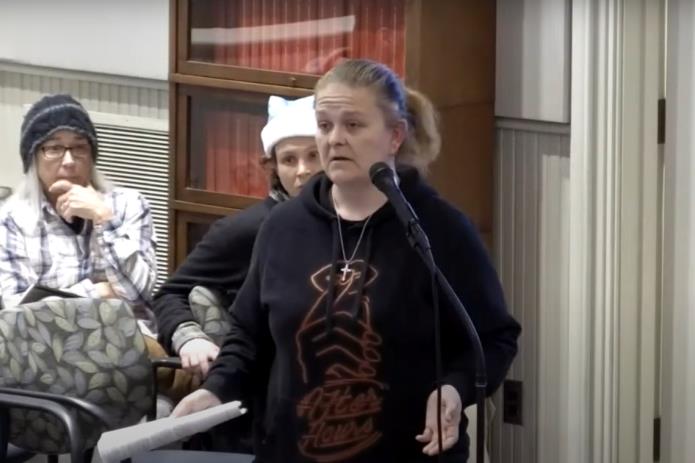
Tuesday night, in response to one woman’s plight, the County Legislature did something about it.
“I have not had a shower since Thanksgiving Day,” Laura Watkins, a self-identified homeless person and parolee, told legislators during public speaking privileges December 17. “I am still housed at the Code Blue shelter with no good hygenical way of cleaning myself,” Watkins complained. I cannot “take my medication on time with food,” she said, nor can Watkins have assurance, she said, that she’ll remain warm during the day.
Tompkins County’s new governmentally-run Code Blue Shelter, quartered in the former Key Bank building at Tioga and Buffalo Streets, was hustled to an opening November 25th. It opened after discussions with St. John’s Community Services fell apart and St. John’s earlier that month abruptly closed its former shelter in Ithaca’s West End and left town. New York State requires cold weather housing for the homeless. But the mandate covers only nighttime accommodations when it’s freezing. The law apparently does not require operators to provide occupants a way to keep themselves clean.
“If we can’t take a reasonable shower, how are we able to go get an apartment?” Watkins asked. “How are we able to go and get a job? I have been denied three times a house because of my body odor,” she claimed.
Watkins’ plea brought action… and action quicker than customarily expected.
“I’m just thinking, we can actually do something tonight to actually alleviate this problem,” Lansing’s Mike Sigler interjected.
And they did.
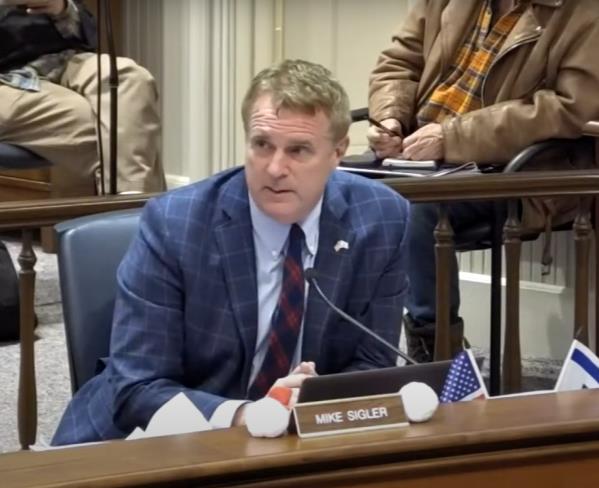
Instead of opting for time-expensive committee deliberations that would postpone a final vote for weeks, the Legislature took Mike Sigler’s suggestion., It cobbled together something on the fly Tuesday night and adopted it unanimously among its 13 attending members.
What Tompkins County will do is pay the YMCA in Lansing—or maybe somebody else—to provide shelter occupants access to shower facilities. The County will also pay for free bus passes to get residents to the shower and back.
Action came so fast that nobody had first checked with the YMCA to secure its permission. But neither legislators nor administrators expected any problems in gaining the Y’s consent.
And County Attorney Maury Josephson assured lawmakers that the bathing benefit would not violate the state’s prohibition against giving things away to people.
“We did have opportunities to have showers, but we blew it, and we have to be accountable for that,” legislator Travis Brooks remarked during the 20-minute discussion that led up to the impromptu vote. “In a community like this, we should be doing better,” Brooks admonished those at his table.
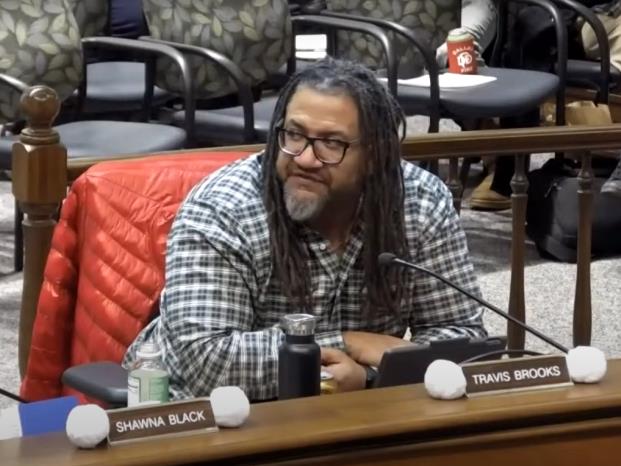
“Whenever I hear someone come in and talk about not being able to take a shower, she’s right, you know,” legislator Shawna Black stated, commending Watkins for attending the meeting and stating her case.
“Walking into a job interview and trying to get a job, and you come in, and you don’t feel good, you don’t look good, you stink, that really is setting someone up for failure,” Black stated. “And we have to do better.”
As to why Tompkins County didn’t do things right in the first place and put a shower trailer behind the retrofitted bank, Commissioner of Social Services Kit Kephart said that in her department’s and County Administration’s collective opinion the building couldn’t accommodate another truck.
“I realize DSS (Social Services) doesn’t do everything perfectly; nobody does,” legislator Deborah Dawson commented at one point.
Acting in haste as they did, legislators had to ask themselves Tuesday where the money for shower benefits will come from.
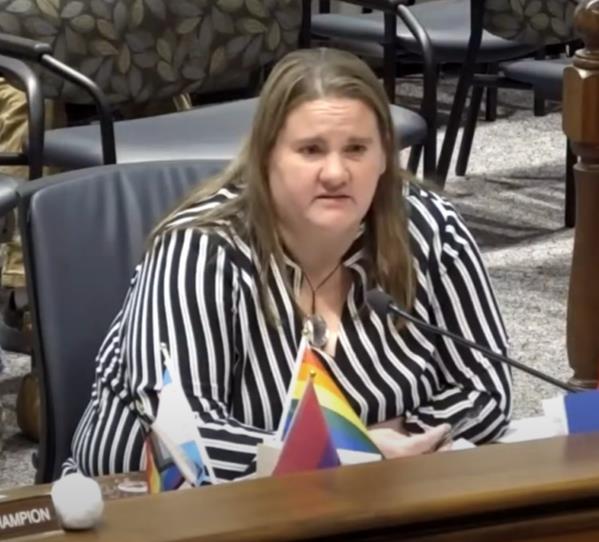
Sigler’s resolution would have Tompkins County first tap its contingency fund for up to $10,000. Eventually, lawmakers hope, New York State will reimburse them for the expense.
Initially, Dryden’s Mike Lane resisted speedy action, preferring Albany first to offer its support. But Sigler inserted qualifying language that addressed Lane’s concerns, and Lane joined in support.
Still, there’s another issue: whether a long bus ride up the hill is the only way for shelter occupants from Ithaca to get their bodies clean.
Suggestions arose as to other shower sites. Anne Koreman mentioned Downtown’s Salvation Army headquarters or Catholic Charities. Randy Brown referenced the Learning Web. Alternatives will be pursued.
“I can’t believe we don’t have resources closer than busing people to the Village of Lansing to take a shower,” Groton’s Lee Shurtleff said with amazement. He urged “flexibility” in the program.
A second vote Tuesday night will make it increasingly difficult for the County Legislature to back away from its much-encouraged, yet increasingly expensive Downtown Center of Government. In effect, the County has put money—your money—where its collective heart quite obviously lies.
With only Groton’s Lee Shurtleff dissenting, the Legislature authorized the County contract with Ithaca-based HOLT Architects for “Design, Engineering, and Construction Administration Services” for the $40-60 Million Downtown office building. HOLT would be paid just short of $4 Million for its services, approximately one-tenth of the building’s estimated cost.
Newfield-Enfield’s Randy Brown chairs the committee that recommended HOLT. And he held out one concession to the frugal: Incremental caution.
“It’s a ‘menu-type’ contract, where we go through various steps,” Brown told colleagues. For example, what if the New York State Office of Historic Preservation balks at tearing down the buildings on which the center would sit?
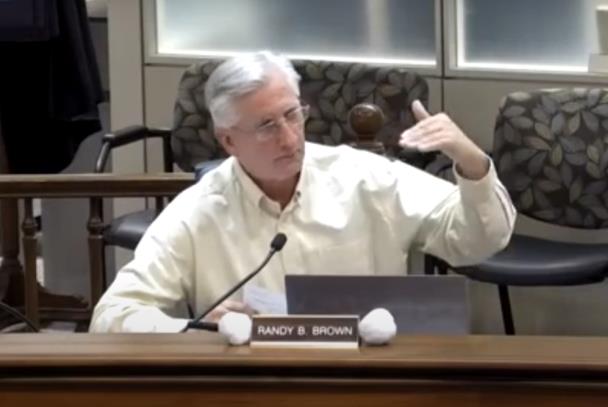
“If we say, well that’s too sensitive to go forward, or we’re not going to take that next step, we can stop the contract and that would be the end of our obligation for payment,” Brown stated.
The vote on the HOLT contract was 12-1. (Legislator Greg Mezey was excused.) Groton’s Shurtleff did not state why he opposed the architectural agreement, but his dissent likely reflected Shurtleff’s past skepticism of the overall project.
Neither the contract, nor the office project itself gained significant discussion at Tuesday’s session. Neither at the Legislature nor at a prior committee meeting were HOLT’s preliminary designs for the building shown, should such renderings even exist. Brown’s committee in recent months had reviewed materials submitted from six firms and talked with representatives from four of them.
Brown’s committee recommended HOLT unanimously. That comes as little surprise. HOLT had prepared space utilization studies previously for County government, recommendations that led to the Center of Government’s planned construction.
****
One final action deserves note; one which affects Tompkins County’s west side residents less in practicality than it does as a matter of principle.
For its second straight meeting, the Legislature considered, and this time passed, an agreement with the Town of Ithaca to help it purchase 135 acres on South Hill to create the Town’s “Sage Preserve.” The adopted measure will forward the Town of Ithaca $200,000 from a County preservation account that now has just over $1 Million in it.
The money would help Ithaca buy private property, take it off the tax rolls, and remove it from what Ithaca Town officials worry would be overly-aggressive residential development.
The matter of principle is that of governmental gifting. At the Legislature’s December 3 meeting, Randy Brown questioned the legal distinction between what’s being done with the Sage Preserve and the tax relief he’d earlier sought to aid the Enfield Community Council, a request he was then told state law did not permit. County Attorney Maury Josephson said the two matters were different.
Last meeting, the Sage subsidy failed to secure any more than seven legislative votes, one short of a majority. This time, the measure passed, 11 to two. Brown and Enfield’s other legislator, Anne Koreman, supported the Sage subsidy in both instances.
###

